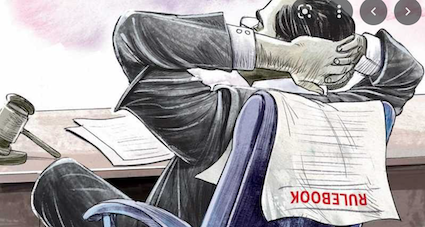(Times of India today has an OpED which puts the searchlight on Indian judiciary. NewsBred thinks it’s out of ordinary, not just because it hauls the issue of our judges accountability a matter of public scrutiny but also that its writers—venerable Bibek Debroy and Aditya Sinha—are high profile names in the Economy Advisory Council to the Prime Minister. Is it the beginning of India’s Executive girding up lions for “Enough is Enough”? More so since the newspaper declares it’s the “first article” on “Legal reforms.” The said article below: )
No questions can be asked about India being a democracy. Is India a “mature” democracy? Since “sabhas” and “samitis” existed in India thousands of years ago, most people will answer it in the affirmative, as they will about Greece, even though neither was a democracy in the modern North Atlantic sense.
But adjectives can be subjective, as with “mature” wine. For clarity in many aspects of life, we look towards courts. A former judge of the Supreme Court (AK Ganguly) has recently told us India is a “mature” democracy. A present SC judge (JB Pardiwala) has told us, even more recently, India isn’t a “completely mature” democracy.
Mature or immature? Since Individuals can have different views, even if they are judges, perhaps the question is immature. But whatever be the definition of maturity, its hallmark is transparency. And since India is a democracy, this implies dissemination of information to citizens, the “demos” bit in the word.
That’s the reason public servants disclose information about their assets and liabilities, ministers and MPs do so (it’s still iffy for MLAs). Bureaucrats (all India services) do so. Lokpal and Lokayuktas Act (2013) is there for a reason.
There’s morality and there is law. Morality transcends law. Morally, anyone who is a public servant, and is funded by the public exchequer through taxes, should part with that information, unless there is something to hide.
Is judiciary funded through the public exchequer? That’s a rhetorical question, which is why the Prevention of Corruption Act includes “judge” under the definition of “public servant”. Morality means disclosure is voluntary, even if the stick of law doesn’t require it.
But if a child is an infant and immature, the rod of law may be required, since volition vanishes. That’s the reason there was the abortive “Declaration of Assets and Liabilities by Supreme Court, High Court and Subordinate Court Judges Bill” of 2009.
In 2009, the Central Information Commission (CIC) though there should be disclosure. But subsequent court cases (SC, HC) put a spanner in the works by exempting disclosure under RTI (Right to Information) Act. The Bill and CIC were both unsuccessful. So consider the arguments that were often proffered.
- Judges are somehow special under the Constitution. They cannot be subject to the same norms of transparency and accountability. Not one, outside judiciary, is likely to take this proposition seriously.
- Information abut assets and liabilities will be submitted by will be kept confidential. They cannot be disclosed to the public.
- Disclosure will be voluntary. It cannot be made mandatory.
Since our democracy is not yet mature, we go around in circles over the second and third point.
In 1997, SC adopted a resolution making assets disclosure mandatory for SC judges. Some, but not all, HCs followed.
Note that there were no clear deadlines. “A reasonable time” after assuming office would suffice. Thereafter, updating would be done only if acquisition was of “a substantial nature”.There was a later resolution by SC in 2009, watering down mandatory to voluntary. HC followed the 2009 resolution.
But since information from voluntary disclosure will be made public—there was no waterline down of that aspect—there is a disincentive against voluntary disclosures.
How effective has voluntary disclosure been? As of July 13, SC’s website gives us asset information for four judges: NV Ramana, Arun Mishra, AM Khanwilkar and Ashok Bhushan. Of these, two including the former Chief Justice) have already retired. Even if one counts 4,4 out of 32 judges (we shouldn’t count the two new appointees is `12.5%. Without the rule of making disclosures mandatory, that’s the extent to which we have matured.
But perhaps one shouldn’t be fixated only on SC. There are 25 HCs. Perhaps they perform better. No such luck.
- Only 7 have any information about assets (and liabilities) of judges. Across these 7 HCs, the percentage of judges who have submitted declarations vary.
- If a disclosure perchentage of 75% is roughly taken as indicative of maturity, Punjab & Haryana HC, Kerala HC and Himachal HC are the only ones who approach that number.
- The high profile Delhi HC scores 17 out of 47, 36.1% not even near the half-way mark.
Perhaps the expression “reasonable time”: makes the exercise of volition even more lax. The argument that some judges have joined recently will not wash. The record of retiring judges isn’t that exemplary either.
A report was recently (2017) published by World Bank and UNODC (United Nations Office on Drugs and Crime) titled ‘Getting the Full Picture on Public Officials.’
UNDOC’s website states, “Barely a decade ago, suggesting to judicial officers that introducing rules and obligations to declare their assets and other relevant interests and activities as part of upholding judicial integrity and preventing opportunities for corruption was met with great scepticism.”
- Out of 161 countries covered, in more than half, judges and prosecutors mandatorily disclose assets;
- For SC judges, the figure is 60%;
- In 56% of those 161 countries, judges and prosecutors are also required to disclose assets, not merely other public officials.
So, judges declaring assets happens in half the world. But that’s not the half India is in.
(This article is reproduced with gratitude to Times of India)
(Panchmukha is interesting content floating on internet, brought by NewsBred for its readers. They don’t necessarily reflect our views but make our platform diverse.)
Post Script: The readers could also read NewsBred’s opinion on “mature democracy” here.)


